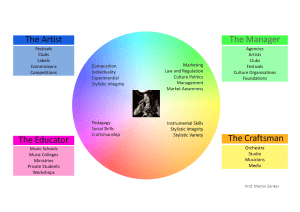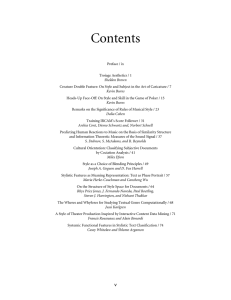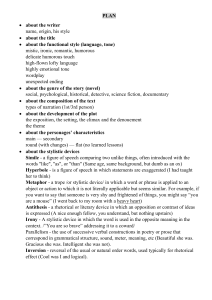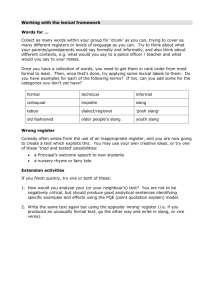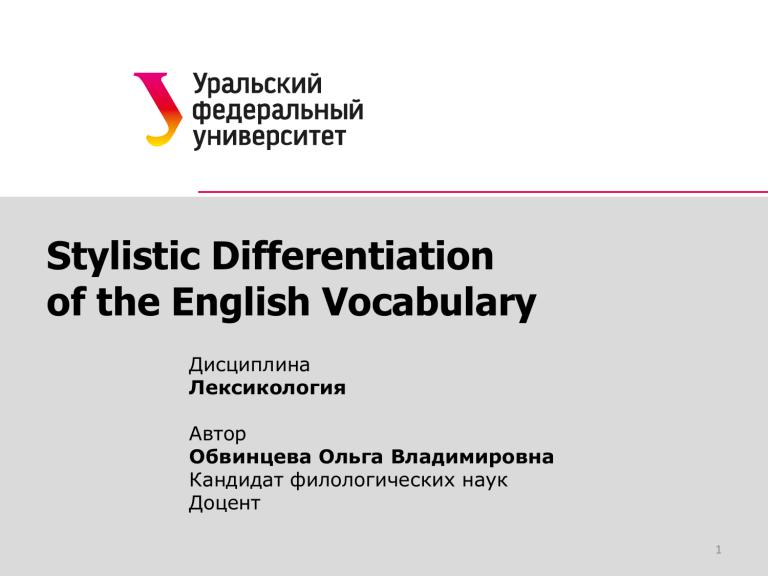
Stylistic Differentiation of the English Vocabulary Дисциплина Лексикология Автор Обвинцева Ольга Владимировна Кандидат филологических наук Доцент 1 Stylistic Differentiation of the English Vocabulary Обвинцева О.В. Цель: Ознакомить студентов со стилистической лексики современного английского языка. классификацией 2 Stylistic Differentiation of the English Vocabulary Обвинцева О.В. Структура 1. 2. 3. 4. 5. Три слоя лексики. Нейтральные слова. Слой литературной лексики и его составляющие. Слой разговорной лексики и его составляющие. Неологизмы в английском языке. 3 Stylistic Differentiation of the English Vocabulary Обвинцева О.В. Layers of the Vocabulary 4 Stylistic Differentiation of the English Vocabulary Обвинцева О.В. Neutral Words • form the bulk of the English vocabulary; • are mostly monosyllabic; • belong to native English stock and early borrowings; • are the main source of polysemy and synonymy. 5 Stylistic Differentiation of the English Vocabulary Обвинцева О.В. Literary Words • common literary words; • terms; • poetical words; • archaic words; • barbarisms and Foreignisms; • nonce-words. 6 Stylistic Differentiation of the English Vocabulary Обвинцева О.В. Terms Term is a word or a word-group which is specifically employed by a particular branch of science, technology, trade or the arts to convey a concept peculiar to this particular activity. Characteristics of terms: • monosemantic within a certain field; • have only denotational meaning; • possess no synonyms. 7 Stylistic Differentiation of the English Vocabulary Обвинцева О.В Terms Determinization: The process when many words that were once terms have gradually lost their quality as terms and have passed into the common literary or even neutral vocabulary. computer, inflation, bonds, suffix… 8 Stylistic Differentiation of the English Vocabulary Обвинцева О.В Poetical Words A set of words which contrast with all other words, because, having been traditionally used only in poetry, they have poetic connotations. array (clothes); billow (wave); brine (salt water); brow (forehead). 9 Stylistic Differentiation of the English Vocabulary Обвинцева О.В. Archaisms and related terms Archaisms words that were once common but are now replaced by synonyms • • • • • betwixt (between); chide (scold); hapless (unlucky; woe (sorrow); perchance (perhaps). Obsolete words words that dropped from the language 10 Stylistic Differentiation of the English Vocabulary Обвинцева О.В Archaisms and related terms Histоrisms words which name the things no longer used • horse-drawn carriages: diligence, landeau, phaeton; • sailing ships: caravel, galleon, schooner; • types of weapons: blunderbuss , crossbow , sword. 11 Stylistic Differentiation of the English Vocabulary Обвинцева О.В Colloquial Words • common colloquial words; • professionalisms; • jargonisms; • slang; • dialectal words; • vulgarisms; • nonce-words. 12 Stylistic Differentiation of the English Vocabulary Обвинцева О.В Classification of Colloquial Vocabulary by I.V. Arnold 1. Literary colloquial : The vocabulary used by educated people in the course of ordinary conversation or when writing letters to intimate friends. • pal, bite, snack ; • exam, fridge, flu; • put up, make out, do away, turn in. 13 Stylistic Differentiation of the English Vocabulary Обвинцева О.В Classification of Colloquial Vocabulary by I.V. Arnold 2. Familiar colloquial : The words belonging to the vocabulary: • are more emotional, free and careless; • are characterised by jocular or ironical expressions and noncewords; • are used mostly by the young and semi-educated people. doc, ta-ta (good-bye), to kid smb. (to tease smb.), shut up, beat it (go away). 14 Stylistic Differentiation of the English Vocabulary Обвинцева О.В Classification of Colloquial Vocabulary by I.V. Arnold 3. Low colloquial : The vocabulary: • represents illiterate popular speech; • contains more vulgar words, and sometimes also elements of dialect. 15 Stylistic Differentiation of the English Vocabulary Обвинцева О.В Professionalisms The words used in a definite trade, profession or calling by people connected by common interests both at work and at home. They name anew already-existing concepts, tools or instruments, and have the typical properties of a special code. Professionalisms used in different trades: • tin-fish (a submarine); • block-buster (a bomb especially designed to destroy blocks of big buildings); • piper (a specialist who decorates pastry with the use of a creampipe) 16 Stylistic Differentiation of the English Vocabulary Обвинцева О.В Jargonisms A group of words whose aim is to preserve secrecy within one or another social group. • grease (money); • loaf (head); • lexer (a student of law). Common jargon: Jargonisms whicn have gradually lost their special quality and belong to all social groups and is therefore easily understood by everybody. comp, quid, bucks, cop… 17 Stylistic Differentiation of the English Vocabulary Обвинцева О.В Jargonisms Special jargon: Remains a foreign language for outsiders of any particular social group. military jargon, students’ jargon, medical jargon… Cant: A kind of special jargon, the jargon of thieves and vagabonds, professional criminals. Ain’t a lifer, not him! Got a stretch in stir for pulling a leather up in Chi. The meaning: He was not sentenced to imprisonment for life: he only has to serve a term in prison for having stolen a purse in Chicago. 18 Stylistic Differentiation of the English Vocabulary Обвинцева О.В Slang There is hardly any other term that is as ambiguous and obscure as the term slang. “Slang seems to mean everything that is below the standard of usage of present-day English.” “The term 'slang' is ambiguous because, to use a figurative expression, it has become a Jack of all trades and master of none.” I.R. Galperin 19 Stylistic Differentiation of the English Vocabulary Обвинцева О.В Slang “Slang is the part of the vocabulary consisting of commonly understood and widely used words and expressions of humorous or derogatory character – intentional substitutes for neutral or elevated words and expressions.” Yu. M. Skrebnev “Expressive, mostly ironical words serving to create fresh names for some things that are frequent topics of discourse. For the most part they sound somewhat vulgar, cynical and harsh, aiming to show the object of speech in the light of an off-hand contemptuous ridicule”. I. V. Arnold 20 Stylistic Differentiation of the English Vocabulary Обвинцева О.В Slang Eric Partridge in “Slang: Today and Yesterday “ (1934) writes that people use slang for any of at least 15 reasons: For example, he says that people use slang: 1. In sheer high spirits, by the young in heart as well as by the young in years; ‘just for the fun of the thing; 2. As an exercise either in wit and ingenuity or in humour; 3. To be ‘different’, to be novel. 21 Stylistic Differentiation of the English Vocabulary Обвинцева О.В Slang Notions that excite an emotional reaction attract as a rule many synonyms: • Money: beans, brass, dibs, dough, wads; • Head: attic, brain-pan, hat peg, upper storey; • Drunk: boozy, cock-eyed, soaked, tight; • Madness: loony, nuts, bananas, psycho; • Woman: babe, chick, skirt; • Man: dude, hunk, hombre. According to the sphere of usage, slang is subdivided into general slang and special slang. General slang represent words that are not specific for any social or professional group. Special slang is peculiar for some group like teenager slang, university slang, football slang, and so on. 22 Stylistic Differentiation of the English Vocabulary Обвинцева О.В Dialectal words A dialect is any variety of English that is marked off from others by distinctive linguistic features. Such a variety could be associated with a particular place or region or, rather more surprisingly, it might also be associated with a certain social group—male or female, young or old, and so on. Some dialectal words have become so familiar in colloquial English that they are universally accepted as units of the standard colloquial English. Examples from Scottish English: lass (girl), lad (boy), daft (silly). 23 Stylistic Differentiation of the English Vocabulary Обвинцева О.В Dialectal words But distinctive vocabulary does not only mark people out as local to particular places. No matter where one comes from, one might eat pudding or dessert or sweet or afters, depending on a whole range of social factors, such as family, education and career, that influence the way a person talks. 24 Stylistic Differentiation of the English Vocabulary Обвинцева О.В Vulgarisms The stylistically lowest group of words of non-standard English which are considered too offensive for polite usage. Two groups of vulgarisms: Expletives and swear words: are used now as general exclamations. damn, bloody, to hell, goddam 2. Obscene words: are known as four-letter words the use of which is banned in any form of intercourse as being indecent. 25 Stylistic Differentiation of the English Vocabulary Обвинцева О.В Neologisms Newly coined words or words that have acquired a new meaning because of social, economic, political or cultural changes in human society. Nonce-word, occasionalism: aword coined to suit one particular occasion. buzz-word: a word or phrase that becomes very popular for a period of time. Literary neologisms: hostile architecture , high intensity training Colloquial neologisms: smasual, emoji, couplie 26 Использованные источники Обвинцева О.В. Использованные источники 1. Арнольд, И.В. Лексикология современного английского языка : учебное пособие / И.В. Арнольд. – 4-е изд., перераб. – Москва : ФЛИНТА, 2017. 376 с. 2. Скребнев, Ю.М. Основы стилистики английского языка : учебник для ин-тов и фак. иностр. яз. / Ю.М. Скребнев М.: Астрель, 2003. 224 с. 3. Crystal, D. A little book of language / D. Crystal. New Haven: Yale University Press, 2010. 260 c. 4. Galperin, I.R. Stylistics / I.R. Galperin. M.: Higher School, 1981. 335 p. 5. Partridge, E. Slang today and yesterday / E. Partridge. London [etc]: Routledge & Kegan Paul, 1979. 476 p. 27
